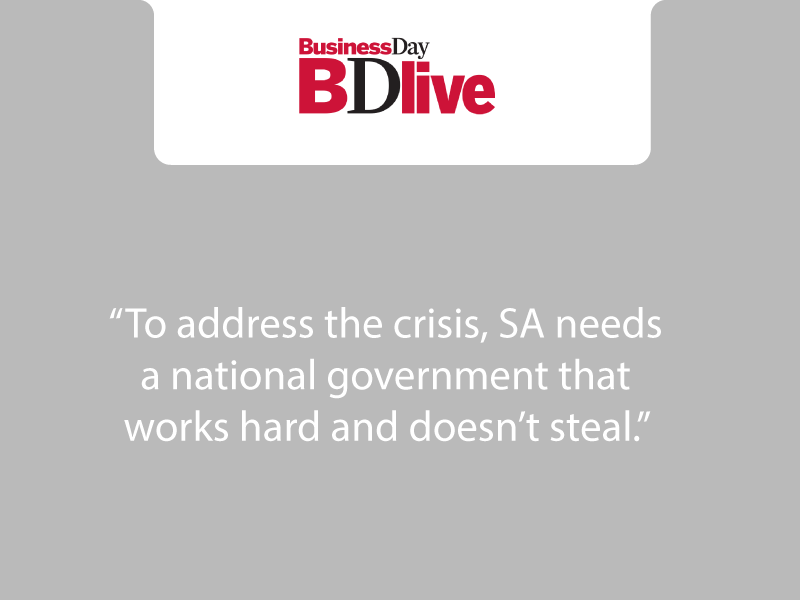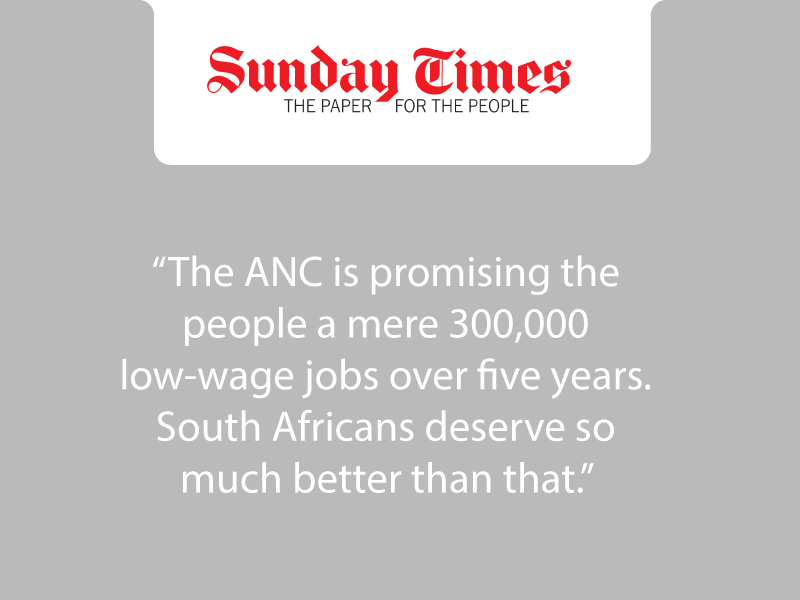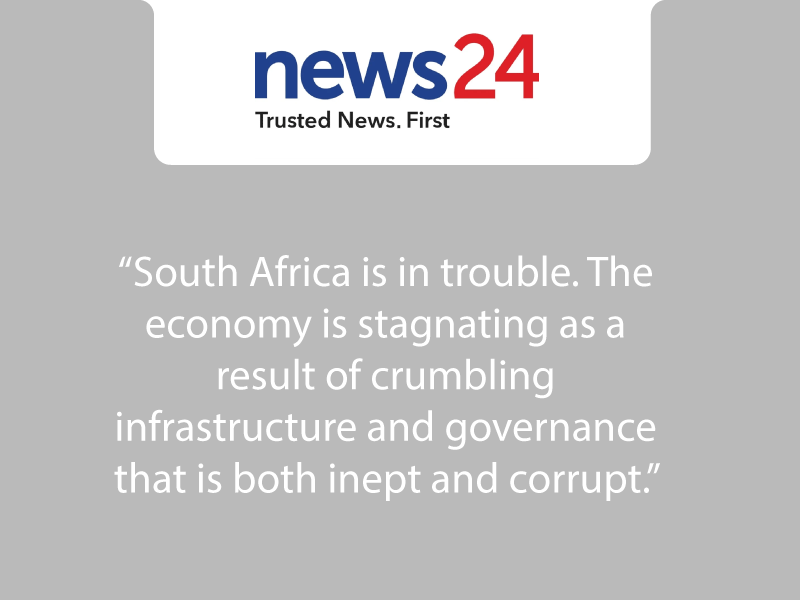Key Points:

IT is time SA had a realistic jobs strategy with the potential to create millions of new jobs for the workforce we actually have. The roots of SA’s overlapping economic, social and political crises can be found in the failure of our economy to create jobs. It is time to stop the wishful thinking and grand but empty promises. SA needs to make some bold new choices and change course.
By some measures, SA’s unemployment crisis is the deepest in the world: in a country of about 30-million working-age adults, about 7.3-million people are unemployed.
SA is exceptionally bad at creating jobs. There is virtually no other country in the world that has anything like as few adults in productive employment or self-employment as SA does. The norm is for about 60% of adults to be employed in most developing countries (Cambodia, Mexico, India, Poland, Thailand). In SA, it is a little more than 40%.
The implications of this are devastating. SA’s mass unemployment is the key cause of poverty and inequality, contributing immeasurably to social dysfunction and political instability. Worst of all, unemployment is a terrible waste of human potential and an assault on human dignity. Almost every unemployed person should be doing remunerated work that improves their lives and develops the country.
There is nothing inevitable about SA’s scandalously high unemployment rate. While it is true SA must deal with the unique and terrible legacy of apartheid, we could be doing considerably better. One reason for the unemployment crisis is that policy makers have been driven by a set of ideas about employment and the labour market that are completely unsuited to the challenges we face. In essence, SA has chosen an approach to employment that says it will accept only jobs that are “decent”. In other words, all South African employees must receive relatively high minimum wages, enjoy considerable legal protection from dismissal and enjoy a high level of basic conditions of employment. Jobs that do not meet these requirements are not the kind of jobs employers should be allowed to offer, and not the kind of jobs the unemployed should be allowed to accept.
In practice, what this means is labour market policy has prevented the creation of the kinds of jobs that were the first point of entry for unskilled workers into modernising economies in the rest of the developing world. These jobs — mainly in light manufacturing and assembly as well as low-end services — represent a real step forward for hundreds of millions of workers in the developing world (think Hong Kong 50 years ago, Vietnam, Thailand, Malaysia and, of course, China). But these kinds of jobs are deemed by policy makers as insufficiently “decent”.
This aversion is disastrous for unskilled work seekers, particularly those who lack experience. It is also in direct contravention of the advice of many international experts. Time and again these experts have said SA must create jobs for the workforce that we actually have and not the workforce policy makers wish we had. Creating the kinds of jobs that could be offered to the undereducated and inexperienced workers who are unemployed is a far more plausible development strategy than one that seeks to create jobs for the workforce that policy makers hope to create in time.
Compared with the alternatives they actually have (unemployment, rural or urban misery and hopelessness, dependence long into adulthood on support from parents and grandparents), working in a factory for low wages and often long hours would be attractive to many hundreds of thousands of people. And these basic jobs are not an endpoint, they can lead — as they have in almost every other country — to better jobs in time.
For those who have them, there are big advantages to having a “decent” job. But the cost of setting high minimum standards all employers must meet is that very few jobs are created. The key questions advocates of the “decent work” agenda fail to tackle include: what do they offer all those people whose skills levels are too low to have any real prospect of securing a “decent job”? Where should they go? To whom should they turn? What do we offer them today and tomorrow if our policy is to prevent low-skill and inevitably low-wage jobs from being created? Why do we want those jobs to go to other countries? For many years now, all we have offered is growing unemployment, exclusion from the modern economy, and no way to find a ladder into work and all the learning and personal self-worth benefits of regular employment.
Ironically, given the supposed sanctity of the “decent work” agenda, there is one area in which the government exempts itself from some of its more aspirational goals — and boasts about doing so.
The Expanded Public Works Programme is the main driver behind the government’s plan to offer 6-million “work opportunities” between last year and 2019. The programme offers only short-term, contractor work, with a minimum wage of less than R80 a day. The jobs offer little training and no opportunities to progress. And, as many consist of little more than picking up litter or waving red flags at passing motorists, they’re not exactly dignity enhancing. Why is it acceptable for the state to employ people on these terms but not for private employers to do so?
The kinds of jobs private sector employers would create — if the environment were right — are almost certainly better than those that the government boasts about in the Expanded Public Works Programme. The experience of almost every country that has ever emerged from poverty has shown it is these kinds of jobs that help put a society and millions of poorer people on the escalator to modernity.
It would be unprecedented for a country to move from mass unemployment to seeing millions of unskilled, inexperienced workers entering global supply chains at a position of their choosing.
Ever since the 18th century, newly industrialising countries, from the UK and Sweden in the past to Vietnam and Bangladesh today, have added most jobs, initially, at the bottom of the value chain, not the top.
SA’s approach has resulted in the worst possible option: mass unemployment. It is time to acknowledge these policies have failed. Sipho Pityana, former labour and foreign affairs director-general and now a leading businessman, says: “SA is an economy in deep trouble … (the) transformation project has become increasingly superficial and separated from the growth imperative we so desperately need … we need to start a proper and honest conversation.”
One place to start that honest conversation is around our approach to mass unemployment. If you are truly interested in broad-based black economic empowerment, getting a job is the most effective and quickest form of empowerment there is.
- Ann Bernstein is executive director of the Centre for Development and Enterprise and author of the award-winning book, The Case for Business in Developing Economies.




